| Listing 1 - 10 of 32 | << page >> |
Sort by
|
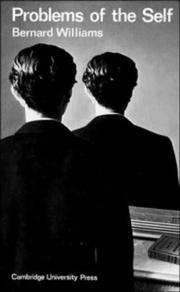
ISBN: 0521202256 0521290600 1139929836 0511621256 0511864558 9780521202251 Year: 1973 Publisher: Cambridge: Cambridge university press,
Abstract | Keywords | Export | Availability | Bookmark
 Loading...
Loading...Choose an application
- Reference Manager
- EndNote
- RefWorks (Direct export to RefWorks)
This is a volume of philosophical studies, centred on problems of personal identity and extending to related topics in the philosophy of mind and moral philosophy.
Self (Philosophy) --- Mind and body --- Human beings --- Moi (Philosophie) --- Esprit et corps --- Homme --- Man --- Homo sapiens --- Human race --- Humanity (Human beings) --- Humankind --- Humans --- Mankind --- People --- Hominids --- Persons --- Philosophy --- Body and mind --- Body and soul (Philosophy) --- Human body --- Mind --- Mind-body connection --- Mind-body relations --- Mind-cure --- Somatopsychics --- Brain --- Dualism --- Philosophical anthropology --- Holistic medicine --- Mental healing --- Parousia (Philosophy) --- Phrenology --- Psychophysiology --- Self --- Psychological aspects --- Human beings. --- Mind and body. --- Self (Philosophy). --- Arts and Humanities
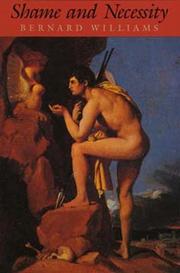
ISBN: 0520080467 0520088301 9780520080461 9780520088306 Year: 1993 Volume: 57 Publisher: Berkeley (Calif.) : University of California press,
Abstract | Keywords | Export | Availability | Bookmark
 Loading...
Loading...Choose an application
- Reference Manager
- EndNote
- RefWorks (Direct export to RefWorks)
The author is a philosopher, but much of his book is directed to writers such as Homer and the tragedians, whom he discusses as poets and not just materials for philosophy. At the center of his study is the question of how we can understand Greek tragedy at all, when its world is so far from ours.
Greek poetry --- Necessity (Philosophy) in literature. --- Philosophy, Ancient, in literature. --- Ethics in literature. --- Shame in literature. --- History and criticism. --- -Necessity (Philosophy) in literature --- Philosophy, Ancient, in literature --- Ethics in literature --- Shame in literature --- Greek literature --- History and criticism --- Necessity (Philosophy) in literature --- CDL --- 82 --- History --- Greek poetry - History and criticism.
Book
ISBN: 0710022972 9780710022974 Year: 1971 Publisher: London: Routledge & Kegan Paul,
Abstract | Keywords | Export | Availability | Bookmark
 Loading...
Loading...Choose an application
- Reference Manager
- EndNote
- RefWorks (Direct export to RefWorks)
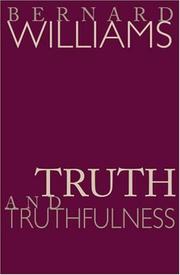
ISBN: 0691102767 0691117918 9780691117911 9780691102764 1282665650 1400825148 9786612665653 9781282665651 9781400825141 Year: 2002 Publisher: Princeton, N.J. : Princeton University Press,
Abstract | Keywords | Export | Availability | Bookmark
 Loading...
Loading...Choose an application
- Reference Manager
- EndNote
- RefWorks (Direct export to RefWorks)
What does it mean to be truthful? What role does truth play in our lives? What do we lose if we reject truthfulness? No philosopher is better suited to answer these questions than Bernard Williams. Writing with his characteristic combination of passion and elegant simplicity, he explores the value of truth and finds it to be both less and more than we might imagine. Modern culture exhibits two attitudes toward truth: suspicion of being deceived (no one wants to be fooled) and skepticism that objective truth exists at all (no one wants to be naive). This tension between a demand for truthfulness and the doubt that there is any truth to be found is not an abstract paradox. It has political consequences and signals a danger that our intellectual activities, particularly in the humanities, may tear themselves to pieces. Williams's approach, in the tradition of Nietzsche's genealogy, blends philosophy, history, and a fictional account of how the human concern with truth might have arisen. Without denying that we should worry about the contingency of much that we take for granted, he defends truth as an intellectual objective and a cultural value. He identifies two basic virtues of truth, Accuracy and Sincerity, the first of which aims at finding out the truth and the second at telling it. He describes different psychological and social forms that these virtues have taken and asks what ideas can make best sense of them today. Truth and Truthfulness presents a powerful challenge to the fashionable belief that truth has no value, but equally to the traditional faith that its value guarantees itself. Bernard Williams shows us that when we lose a sense of the value of truth, we lose a lot both politically and personally, and may well lose everything.
Credibilite --- Credibility --- Falsehood --- Geloofwaardigheid --- Insincerite --- Leugen --- Lying --- Mensonge --- Onoprechtheid --- Truth --- Truthfulness and falsehood --- Untruthfulness --- Vérité --- Vérité et mensonge --- Waarheid --- Waarheid en leugen --- Believability --- Truth. --- Truthfulness and falsehood. --- Reliability --- Honesty --- Conviction --- Belief and doubt --- Philosophy --- Skepticism --- Certainty --- Necessity (Philosophy) --- Pragmatism --- Post-truth --- #A0212W --- Philosophical anthropology --- Theory of knowledge --- genealogie --- kennisleer
Book
ISBN: 0521212014 9780521212014 Year: 1976 Publisher: Cambridge: Cambridge university press,
Abstract | Keywords | Export | Availability | Bookmark
 Loading...
Loading...Choose an application
- Reference Manager
- EndNote
- RefWorks (Direct export to RefWorks)
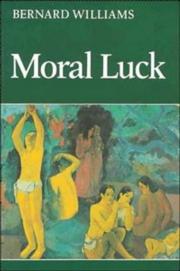
ISBN: 0521286913 0521243726 1107263522 1139165860 9780521286916 Year: 2002 Publisher: Cambridge: Cambridge university press,
Abstract | Keywords | Export | Availability | Bookmark
 Loading...
Loading...Choose an application
- Reference Manager
- EndNote
- RefWorks (Direct export to RefWorks)
A new volume of philosophical essays by Bernard Williams. The book is a successor to Problems of the Self, but whereas that volume dealt mainly with questions of personal identity, Moral Luck centres on questions of moral philosophy and the theory of rational action. That whole area has of course been strikingly reinvigorated over the last deacde, and philosophers have both broadened and deepened their concerns in a way that now makes much earlier moral and political philosophy look sterile and trivial. Moral Luck contains a number of essays that have contributed influentially to this development. Among the recurring themes are the moral and philosophical limitations of utilitarianism, the notion of integrity, relativism, and problems of moral conflict and rational choice. The work presented here is marked by a high degree of imagination and acuity, and also conveys a strong sense of psychological reality. The volume will be a stimulating source of ideas and arguments for all philosophers and a wide range of other readers.
Ethics --- Deontology --- Ethics, Primitive --- Ethology --- Moral philosophy --- Morality --- Morals --- Philosophy, Moral --- Science, Moral --- Philosophy --- Values --- Philosophical anthropology --- General ethics --- Arts and Humanities --- Ethics.
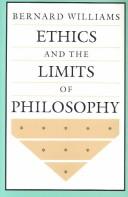
ISBN: 0674268571 067426858X Year: 1985 Publisher: Cambridge London : Harvard University Press,
Abstract | Keywords | Export | Availability | Bookmark
 Loading...
Loading...Choose an application
- Reference Manager
- EndNote
- RefWorks (Direct export to RefWorks)
Ethics --- Deontology --- Ethics, Primitive --- Ethology --- Moral philosophy --- Morality --- Morals --- Philosophy, Moral --- Science, Moral --- Philosophy --- Values --- General ethics --- Éthique --- Morale
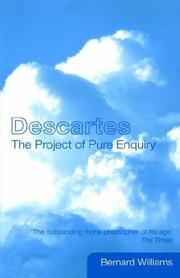
ISBN: 0415356261 041535627X 9780415356268 9780415356275 Year: 2005 Publisher: London: Routledge,
Abstract | Keywords | Export | Availability | Bookmark
 Loading...
Loading...Choose an application
- Reference Manager
- EndNote
- RefWorks (Direct export to RefWorks)
Descartes, René, --- Descartes, René --- Descartes, Renatus --- Cartesius, Renatus --- Descartes, René, - 1596-1650.
Book
ISBN: 9780521242677 0521242673 Year: 1981 Publisher: Cambridge: Cambridge university press,
Abstract | Keywords | Export | Availability | Bookmark
 Loading...
Loading...Choose an application
- Reference Manager
- EndNote
- RefWorks (Direct export to RefWorks)
Book
Year: 1973 Publisher: Cambridge Eng University Press
Abstract | Keywords | Export | Availability | Bookmark
 Loading...
Loading...Choose an application
- Reference Manager
- EndNote
- RefWorks (Direct export to RefWorks)
| Listing 1 - 10 of 32 | << page >> |
Sort by
|

 Search
Search Feedback
Feedback About UniCat
About UniCat  Help
Help News
News